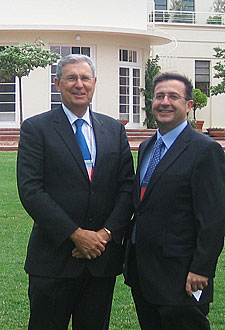The General Synod program is pretty intense " most days 8:15am " 9:00pm. But one of the real joys is the way it gives you extended time to get to know Christians from your own and others dioceses, over lunch or dinner breaks. People I have known about are now people I know. It's a bit like an extended house party! I've enjoyed getting to know reps from Adelaide, Newcastle, Melbourne and Ballarat. Today Rob Wicks and I had lunch with two members of the Anglican Franciscan religious order, who are here as observers.
The Synod business was fairly tedious today, but it was topped and tailed by two interesting debates.
Focus on environment
The early morning session focussed on the environment, in a presentation led off by Bishop George Browning of the host diocese. I still cannot agree that this is the church's core business or mission (surely that is making disciples of Jesus). But I was especially impressed by his passionate desire to think of what sort of environment he wanted to leave for his 8 or 9 grandchildren (and counting) in 50 years or so.
He suggested the science on climate change is settled. It's happening. And he suggested the theology on the environment is settled. Man was created from the dust of the earth, and human sin clearly impacts the fabric of creation. He cited Steve Biddulph, better known for his parenting stuff, but now apparently a Uniting Church minister. Apparently Biddulph says you don't need to read the newspapers for the next 20 years, because you know there'll be three main topics: energy use, climate change and refugees " many of them environmental refugees displaced by the impact of climate change, whether Pacific islanders fleeing rising sea levels, or farmers walking off their land.
Bishop Browning stressed that it was the prosperous who had choices in these matters, to reduce our consumption, our environmental footprint. We then heard a raft of ideas being implemented in different dioceses; such things as power and water use audits in parish properties, through changing church gardens from English style to Australian natives with lower water requirements, and on to church participation in Clean Up Australia Day.
I had minor quibbles. I was certainly not persuaded by the suggestion that failure to act on climate change was akin to genocide. That demeans those who have faced the slaughter of genuine genocide by (para)military action. And although population issues are clearly an issue, I was not persuaded by the assertion that the globe is definitely over-populated. I just don't think we can know, and surely reduction in our gross western over-consumption is the place to start (even though I enjoyed my chunk of synod steak the night before)! Still the motions were rightly and whole-heartedly supported.
A quota for women
The other item of note came near the end of the day's business. This was a motion urging equal representation of women in decision-making at all church levels, including General Synod Standing Committee's Commissions and Task Forces, with the same recommendation to Diocesan Synods. This was interesting because the speakers for and against did not just line up on "party lines'. Sydney delegates diverged in their views. And those from a strong feminist or egalitarian position also differed. Everyone agreed that it was good to have higher female representation at Synod and on many other committees. It would also set a good example to other parts of the Anglican Communion. But the nub of the argument is the old chestnut of whether positive discrimination via quotas really changes things. In the end, we need to appoint people on merit, considering gifts, training, experience, and availability, alongside better gender representation.
 After that, many delegates were off to a reception kindly given to General Synod at Government House, by the Governor General, Michael Jeffrey. The hospitality was generous and it was another chance to mix. I appreciated the fact that the Governor General actually gave us his opinions in his brief welcome speech rather than bland "nothings'. Clearly a man of Christian faith, he was very keen about the new schools chaplaincy scheme rolled out in the last year. Despite the differences, he also encouraged inter-faith dialogue. In reply the Primate (whose sense of humour has been widely appreciated at Synod) replied that the Anglican Church was possibly the only denomination that could have inter-faith dialogue within the denomination! This brought laughs from all sides.
After that, many delegates were off to a reception kindly given to General Synod at Government House, by the Governor General, Michael Jeffrey. The hospitality was generous and it was another chance to mix. I appreciated the fact that the Governor General actually gave us his opinions in his brief welcome speech rather than bland "nothings'. Clearly a man of Christian faith, he was very keen about the new schools chaplaincy scheme rolled out in the last year. Despite the differences, he also encouraged inter-faith dialogue. In reply the Primate (whose sense of humour has been widely appreciated at Synod) replied that the Anglican Church was possibly the only denomination that could have inter-faith dialogue within the denomination! This brought laughs from all sides.
In a tremendous end to the day, Paul Barker from Melbourne with Richard Trist and Stephen Hale organised a dinner for evangelicals at a near-by café. There were over 60 of us from about 9-10 dioceses, and it really was a get-to-know-you exercise. But Peter Jensen briefly said how good it was to see us working well together. And like I said at then start, how true that has been.























